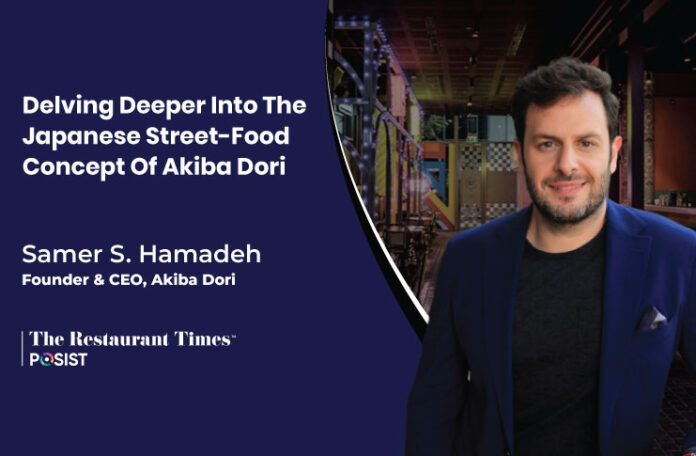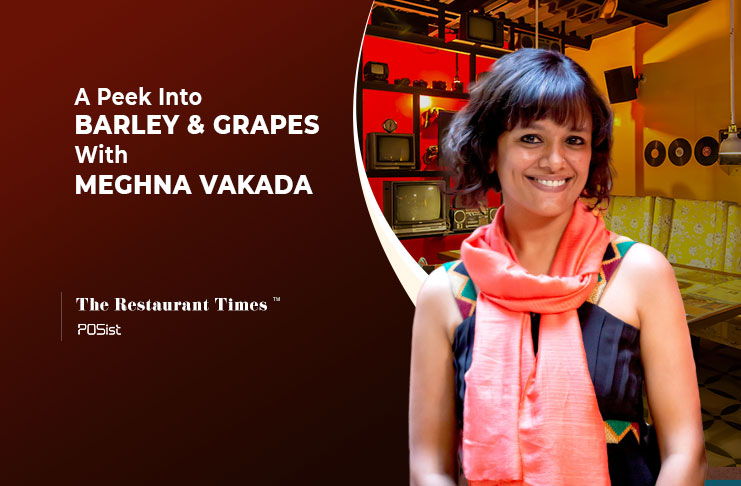Akiba Dori is a critically acclaimed Japanese street-food concept which houses the only Tokyo-style Neapolitan Pizzeria in the Middle East & is located in the heart of Dubai Design District.
The brand was conceived in April 2018 by Samer S. Hamadeh, whose previous concepts include Republique & Stereo Arcade. In 2011, Samer decided it was time to venture into a new domain and explore the world of hospitality, something he had always been interested in. So he took the seven years of entertainment experience alongside his solid social network and launched the now critically acclaimed nightlife brands Republique (2011) & Stereo Arcade (2015).
Both were incredibly popular in their own rights and earned him the reputation as being a disruptive concept creator. Following the success of these ventures, Samer launched his latest concept, Akiba Dori (2018), in Dubai Design District and is taking the brand to Saudi Arabia with Akiba Dori Jeddah opening in Q1 of 2021 and Riyadh to follow, in addition to expansion into Abu Dhabi.
Taking inspiration from Tokyo’s neon-filled district, Akihabara, the venue boasts distinct styling and vibrant interiors throughout with main features like an arcade, café, bar, and pizzeria, all tied together by a modern storefront aesthetic. Diners are welcomed through the doors to indulge in a selection of redefined Japanese favorites, sharing-style appetizers, and a unique pizza experience that is set in a lively, neon-filled atmosphere. 2021 promises further expansion of the brand across the Middle East, starting with Jeddah, KSA, as a first international outpost followed by Abu Dhabi.
In Conversation With Samer S. Hamadeh, Founder & CEO, Akiba Dori
In an exclusive conversation with The Restaurant Times, Samer S. Hamadeh, Founder & CEO Akiba Dori, discusses how he came up with an arcade, bar, and club at one place and highlights the trends emerging in the restaurant industry.
This is the second in a series of interviews hosted by our guest host, Peggy Li, Managing Partner at SBS Affinity Consultancy, who brings 18 years of experience working with Michelin-starred fine-dining across the UK and the Far East.
Peggy has worked with some of the greatest chefs, including Joël Robuchon, Gordon Ramsay, and Atul Kochhar.
Peggy Li: Dubai Design District (D3) is an interesting place. Why did you choose this place to set up Akiba Dori?
Samer: Akiba Dori is my first restaurant. I have exclusively done bars and restaurants in the past, and never had a problem with location. I never relied on PR agencies, promoters, or third-party organizations to help draw a crowd in and did it all by myself.
I was confident in saying that I could put my ground anywhere and people would come. D3 was a community decision more than a location decision. The only communities that like D3 are Dubai Media city, internet city, and the IFC.
There is a difference between the media city and the internet city, and IFC was difficult and expensive to get into. Still, it’s easier now in the two years as the market has matured and the landlord has to, which is always very good because the last one needs is a decade of delusional landlords and their development is best in the town.
I was in love with the community of D3, people that worked there and created things there. Fashion here is the biggest community, and they are the best. The Ex-executive director, Mohammad Shayad and the managing director at that time, Imran Shah, built a strong base which continues to date and is a sign of a healthy landlord relationship. I couldn’t find such a community anywhere else.
If I wanted to open a brand, the fastest way to build a brand is to have a loyal fan base, and if that loyal fan base happens to be the tastemakers, then I’ve struck gold.

Peggy: We are still coming out of 2020, tell us how your business is now after the Covid restrictions. Would you say that your company has currently recovered? How has your business transition been?
Samer: From a business perspective, we are fortunate that Dubai handled the pandemic, and I say Dubai, especially because, I don’t know what it was for people in Saudi. We had the financial backing from the Dubai government, as they mentioned last year that they would be supporting F&B business, and we are lucky for that.
Dubai did so much to help us as a city, and this is a city acting as a county, and I would say that this got us through the pandemic. When there was a lockdown, we were open for deliveries, we didn’t lose any staff during the pandemic.
If we were anywhere else in the world today, perhaps I wouldn’t have a restaurant. 2020 for us, financially speaking, was better than 2019. It’s really important to say that the role Dubai played in keeping us afloat was huge, and we were a very healthy business. To begin with, we were in a supported and safe position.
For instance, some other companies were less fortunate and didn’t survive 2020, and that’s normal. It is such a cash incentive business that restaurants and venues barely have a couple of months of working capital in the bank. For example, if you had a nightclub in 2020, the odds of you coming back in 2021 are very slim. And I can’t say this enough, but is there any other industry better than the F&B industry on earth?

Peggy Li – I think we have to be crazy, to start with, highly social and very stubborn at the same time. So, we have to have these three pillars of attributes to qualify into this industry, don’t we? How did you come up with the idea of an arcade, bar, and club in one space?
Samer: I am not the kind of person stuck in the past, and I can’t dwell on what’s gone. The only exception, in this case, I would make is music. I grew up in Saudi in the 80s, I moved to Lebanon and then to Dubai.
In my time back then, I didn’t have an experience to understand but my creative outlet; and my greatest ideas have always come through a soundtrack attached to that.
So, when I’m working on a concept, I’m always listening to music, which helps me think and develop things. I’ve also been a gamer my whole life, an athlete or a gamer.
Stereo Arcade is where I have the 80s and 90s music, and with stereo, I wanted to create and open the club that I would’ve had if in the 88s. And all the knowledge that I have from that era is the stereo arcade.
I grew up on arcades and most of my friends did too, and it’s human nature to reminisce of a better time. And most people when they think of their best time, it is when they have very little responsibility. And the last time people were irresponsible around me was when I went to the arcade.
So if you recreate that ambiance and people walk in and see an arcade, it’ll bring back some crazy memories and take them back to a time where the idea of getting dressed up and going to the nightclub exists. I also wanted a rock bar because, in Dubai, you don’t get to see that often.
Peggy Li: Walk us through the kingdom of expeditions of Japanese food in Dubai and how are you going to go about it?
Samer: I spent my childhood in Riyadh, Saudi and it was completely different from what we have now. Growing up there made me who I am because I was fortunate enough to go to the American school which felt like someone ripped a plot of land from Pennsylvania or New York. It was an incredible school!
I had all the freedom like wearing what I wanted to and having long hair, but then I moved to Lebanon and the restrictions kicked in, and I thought to myself, “what is this backward time?”.
I always wanted to do something in Saudi because, I remember, when I was a kid, everyone here had an amazing appetite for food. The best place of my time was a place called the “Shogan” which is a Japanese place and still is my favorite. When I thought about Akiba Dori, I thought that this is something that I could take back to Saudi.

Peggy Li – How do you see the operations in Dubai from the audience in the Kingdom?
Samer: The general public in Saudi Arabia is well-traveled locally. What I will be doing is the same as what I did in Dubai; we will serve one of our best-selling dishes, for half the price when the competitor sells it for full price, and so double the quantity.
The way that is going to happen is because we are not a franchise, and we don’t have to pay the licensing cost. We are also happy with the smaller margin because what’s the point in making good food if no one can eat it?
Restaurants are there for the customers and the people who like food, not for critics. A great review is a moral thing for the staff and not for the customers. The world is made up of taste and no one would look at these reviews from Michelin starred reviews. We are fully localizing Akiba Dori as everything in Saudi is Arabic.
Peggy Li: What are the core values that help the business survive?
Samer: The last thing I want to hear about Akiba Dori is “Oh it was amazing, but the last time we went there, it wasn’t that great.” I know why these things happen, because after some time it becomes about making more money, and that’s unfortunate. Restaurants are this third space where people meet.
For instance, no one goes to the movies to meet new people, but people go to bars, coffee shops, the restaurants to meet. That is why I think it’s the most resilient industry on the planet because after coming back from a pandemic, people rushed to the restaurants, not to the cinemas, concerts.
We are social animals, and we want to be around people, that is the reason why the human race survived. The most important part of the hospitality business is in the term itself – hospitality. If you don’t treat your customers with the best service, you are in the wrong business.
As long as your obsession is with giving quality service to the customers and you don’t change that because it’s more cost-effective, you’ll be fine. If your restaurant is in a good location, you’re good in the media, as long as you focus on satisfying customers, satisfying their needs, and serving them well, your restaurant business will surely flourish.
Peggy Li: What will be your message or word of advice to future restaurateurs who are aspiring to open a restaurant or start their venture?
Samer: There’s always a worst-case scenario in every business. Before you get into the business, make sure you’re comfortable with that worst-case scenario.
If you’re okay with it, you’ll be able to do well. But if you’re going into something with crazy expectations, and you’re okay to pack your bags and leave when something goes wrong, don’t enter the business. Always be mentally prepared that anything can go wrong and prepare for it in advance.
For the full interview, please watch the video between Peggy and Samer.

















